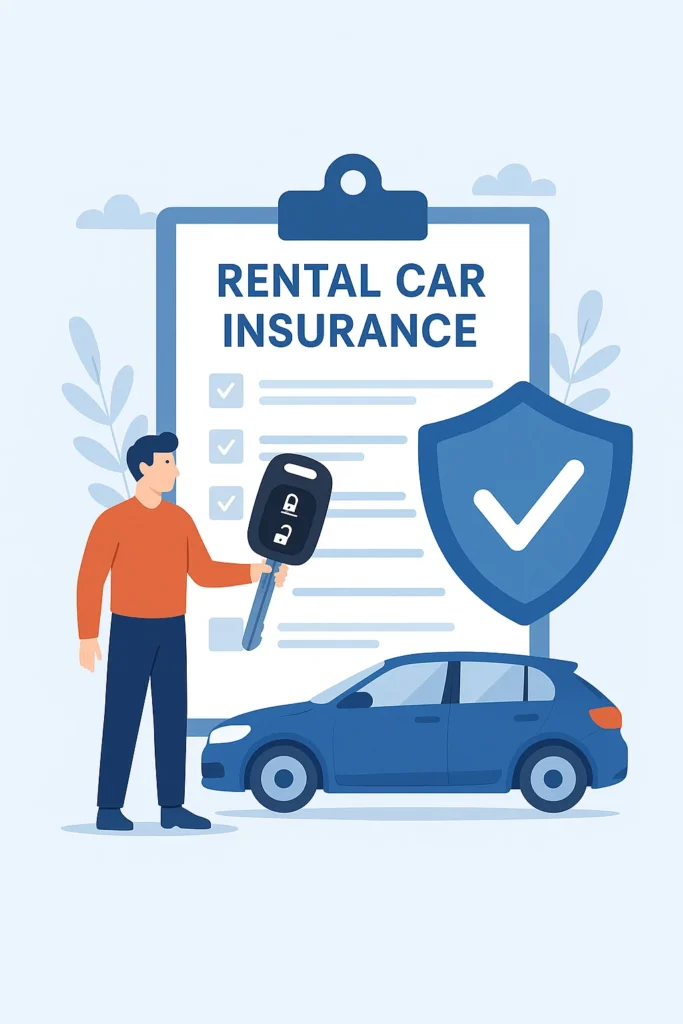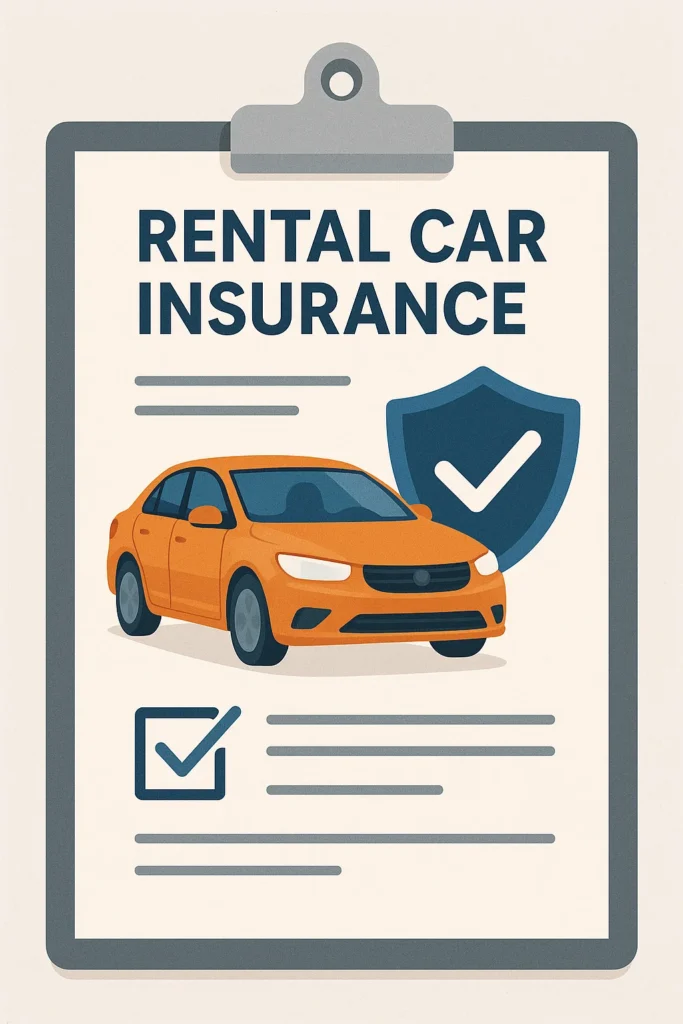Rental Car Insurance: What You Need to Know Before You Drive Off
Renting a car can be simple—but knowing whether you need rental car insurance is often anything but. Before you sign that agreement or click “Accept” at the counter, it’s essential to understand what you’re paying for, what you’re already covered by, and what’s truly necessary.
Many drivers pay for duplicate coverage or mistakenly decline crucial protections. According to the Insurance Information Institute, you may already have protection through your own auto insurance, but depending on your policy and the type of rental, there may still be gaps.
If you’re planning to drive internationally, you’ll also want to check this official travel checklist from the U.S. Department of State, as your U.S.-based insurance or credit card coverage might not apply overseas.

Do You Really Need Rental Car Insurance?
That depends on several factors:
- Whether your personal auto insurance extends to rentals
- The type of vehicle and how you’re using it (personal vs. business)
- Whether your credit card provides rental protection
- Where you’re renting (U.S. or international)
In most domestic rentals, if you have comprehensive and collision coverage on your own vehicle, you may not need to purchase extra rental insurance.
Check Your Existing Auto Insurance First
Before you accept or decline any coverage at the rental counter, contact your auto insurance provider and confirm:
- Does your policy cover rental cars used for personal travel?
- Are collision and comprehensive coverage included?
- Do you have protection for loss of use, towing, or administrative fees?
- Are there any exclusions (like commercial use or certain vehicle types)?
Many insurers extend the same coverage limits and deductibles from your personal vehicle to your rental—just be sure to double-check.
Homeowners or Renters Insurance: What It Covers
Your auto insurance won’t cover personal items stolen from the car—but your homeowners or renters insurance might. This type of coverage can apply if:
- Items are stolen from a locked or unlocked rental car
- Damage occurs due to a break-in
However, deductibles apply, and some policies exclude high-value items like electronics or jewelry.

Credit Card Coverage: A Hidden Perk
Many credit cards offer secondary rental car insurance as a benefit—meaning it kicks in after your personal insurance. But not all cards are equal. Some cards provide:
- Collision damage waiver (CDW) coverage
- Reimbursement for theft, vandalism, and towing
- Limits on types of vehicles covered (no exotic cars!)
For example, cards from Visa, Mastercard, or American Express often include this benefit, but only if you use the card to book and pay for the rental. Review your benefits guide or call your card provider for written confirmation. You can also reference the FTC’s consumer guide for additional tips on renting a car wisely.
What Does the Rental Company Offer?
Most rental companies offer four types of optional insurance or protection:
1. Loss Damage Waiver (LDW) / Collision Damage Waiver (CDW)
This waives your financial responsibility if the rental is damaged or stolen. It’s not technically insurance, but it acts like it.
- May also cover towing, loss of use, and administrative fees
- May become void if you violate the rental agreement (e.g., speeding, DUI)
2. Liability Coverage
Covers damage to other people or property. Most states require minimum coverage, but it may be insufficient.
- If you don’t carry auto insurance, strongly consider this
- You can also purchase Supplemental Liability Insurance (SLI) for higher limits
3. Personal Accident Insurance
Covers medical expenses for you and your passengers.
- Often unnecessary if you have PIP or solid health insurance
- Can duplicate coverage you already carry
4. Personal Effects Coverage
Protects belongings stolen from the rental car.
- Only useful if your renters/homeowners policy doesn’t include off-premises theft
- May come with low limits
Rental Platforms: What Coverage Comes with Each Type?
Traditional Rental Companies (Hertz, Avis, etc.)
You’ll typically be offered all four coverage types listed above. These are usually add-ons at the counter or when reserving online.
Car Sharing Services (e.g., Zipcar)
Membership-based platforms often include basic insurance:
- Includes liability and limited collision coverage
- Younger drivers may be subject to higher deductibles or reduced limits
- Optional damage waivers may reduce your responsibility in case of an accident
Peer-to-Peer Rentals (e.g., Turo, Getaround)
Insurance policies vary by host and rental tier:
- Protection plans range from minimal to premium
- Some renters may decline all coverage—leaving full liability to you
- Review each plan’s terms carefully before booking
What Happens If You’re in an Accident or the Car Is Stolen?
Here’s what to do if you experience an incident with your rental car:
- Call the police and file a report immediately.
- Contact the rental company and follow their incident procedure.
- Inform your insurer and/or credit card provider if applicable.
- Document everything—photos, rental agreement, incident report, and receipts.
Depending on your coverage, you may need to pay upfront and get reimbursed later.
Common Pitfalls to Avoid
- Assuming your personal insurance covers everything
- Skipping liability coverage when you have no existing auto policy
- Renting luxury or specialty vehicles not covered by your insurer or card
- Violating rental terms (e.g., off-roading, unauthorized drivers)
Frequently Asked Questions
Does my personal car insurance cover rentals?
Yes, if you have full coverage and use the rental for personal (not business) purposes.
Do credit cards provide rental insurance?
Many do, but coverage is often secondary and limited in duration or location.
Is CDW the same as LDW?
Yes. Both waive your financial responsibility for the rental car if damaged or stolen.
Should I buy rental insurance when traveling abroad?
Usually, yes—your personal policy or credit card likely won’t apply overseas.
Can someone else drive the rental?
Only if they’re listed on the rental agreement. Otherwise, coverage may be void.
What if I don’t own a car or have insurance?
You can purchase a non-owner liability policy or rely on rental-provided coverage.
Final Thoughts
Rental car insurance doesn’t need to be confusing. With a little research into your current coverage and an understanding of what rental companies offer, you can avoid overpaying—and ensure you’re fully protected.
When in doubt:
- Review your auto insurance policy
- Confirm credit card benefits
- Don’t overlook the fine print on peer-to-peer or car-sharing platforms
Make informed decisions, and you’ll hit the road with peace of mind.